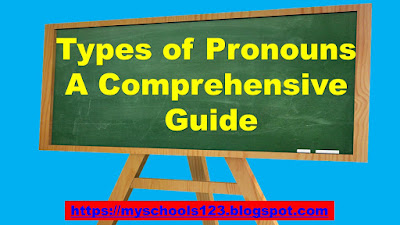Types of Pronouns
2. PRONOUN
2. Pronoun: - Pronoun is word which is used instead of a Noun.
Eg:- Sita - She
Ramu - He
Book - It
Students - They
 |
| Types of Pronouns A Comprehensive Guide |
Types of Pronouns A Comprehensive Guide
Kind of Pronouns: - There are mainly nine kinds of pronouns.
They are:-
1.
Personal Pronouns.
2.
Reflexive or Emphatic.
3.
Possessive Pronouns.
4.
Demonstrative Pronouns.
5. Interrogative Pronouns.
6.
Relative pronouns.
7.
Indefinite pronouns.
8.
Distributive pronouns.
9. Reciprocal pronouns.
1. Personal
pronoun: - Personal pronouns which are
related to persons are called personal pronouns. These are three types.
They are:-
1.
First
person
2.
Second
Person
3. Third Person
LIST OF PERSONAL PRONOUNS:-
|
Person |
Number |
Subjective Pronoun Pr. – 1 |
Objective pronoun pr. – 2 |
Possessive Adjective Pr.3
|
Possessive pronoun Pr.4
|
Reflexive pronoun Pr.5
|
|
I |
Singular Plural |
I we |
me us |
my our |
mine ours |
myself ourselves |
|
II |
Singular Plural |
you you |
you you |
your your |
yours yours |
yourself yourselves |
|
III |
Singular Plural |
he she it they |
him her it them |
his her its their |
his ours its theirs |
himself herself itself themselves |
2. Reflexive/Emphatic
Pronoun:- myself, ourselves, yourself,
yourselves, himself, herself,
itself, themselves are called reflexive or Emphatic Pronouns.
Eg:
- 1.I will do it myself.
2. She hurt herself.
3. You can explain it yourself.
4. They admit themselves.
Note:- Myself, our selves, your selves, himself,
herself, itself, themselves Reflexive Pronoun.
Emphatic
pronoun:-
Eg:-
1.
I
myself will do it.
2.
I
myself heart.
3.
You
yourself can explain it.
4.
They
themselves admit.
Note:- Pronoun
myself, our selves emphatic pronoun
.
3. Possessive Pronoun: -
mine, ours, yours, his, hers, its, theirs are called possessive pronouns.
Eg:-
1.
This
is mine.
2.
It
is yours.
3.
Don’t
take it because it is hers.
4. Take his book but don’t take ours.
4. Demonstrative
Pronoun:- Pronouns which are used to show the
objectives, are called demonstrative pronouns.
Eg:- This, These, that, those
1.
This is a book.
2.
These
are my
books.
3.
That
is my bag.
4. Those are mangoes.
5. Interrogative
Pronouns: -
Interrogative Pronouns refer to asking questions. Whose, what, which, when, where, why, How.
Eg:-
1.
What are you doing?
2.
Which is your native place?
3.
Where are you going?
4.
When
is your
birthday?
5.
Why are you late?
6. Relative
Pronoun:- A
relative pronoun “relates” or refers to a noun, which has gone before Who, What,
Whose, which, what, that whom, etc.
Eg:-
1. Raju is my friend who tells me stories.
2. This is the bag which I
bought yesterday.
3. This is the man, whom
you sent to me.
4. This is the house that my
father built.
Note:- Who, whose, whom refer to human beings and persons
what, which, that refer to things.
7. Indefinite
pronouns:-Pronouns
which do not refer to any particular person or thing are called Indefinite
pronouns
Eg: - Someone, anyone, everyone, none,
something, anything, everything, nothing, somebody, anybody, everybody, nobody
Eg:- 1. Someone stole my watch.
2. Everyone is present in the class.
3. Everything is easy.
4. Nothing is wrong in the
sentence.
8.
Distributive Pronoun:-
Each,
either, neither are called distributive pronouns.
Eg:- 1.Each of the boys
is qualified.
2.
Neither of the students is true.
3.Either
of the two must have it.
9. Reciprocal
Pronoun:- Each other, one another are called
reciprocal pronouns.
Note: - Each other, one another
denote a mutual or reciprocal relationship, each other is usually used to refer
to, two persons or things.
One
other is used to refer to more than two persons or things.
Eg:-
1.
The
two girls help each other












0 Comments:
Post a Comment